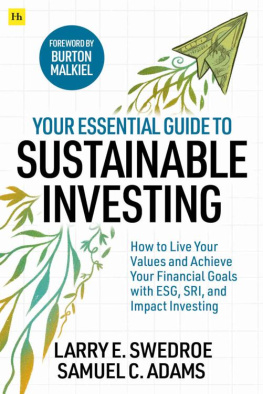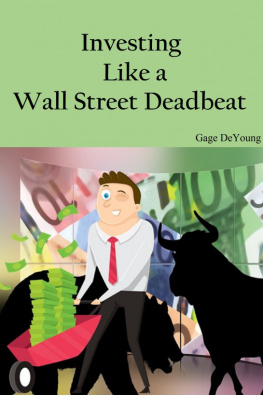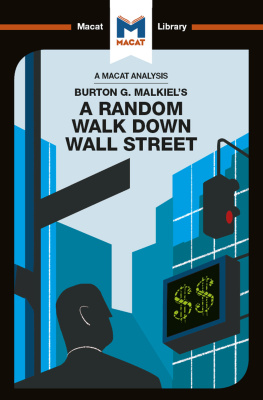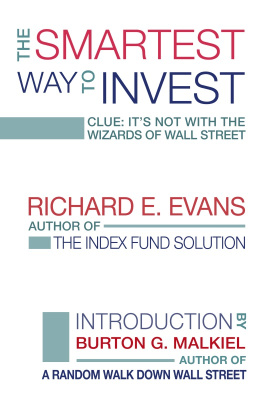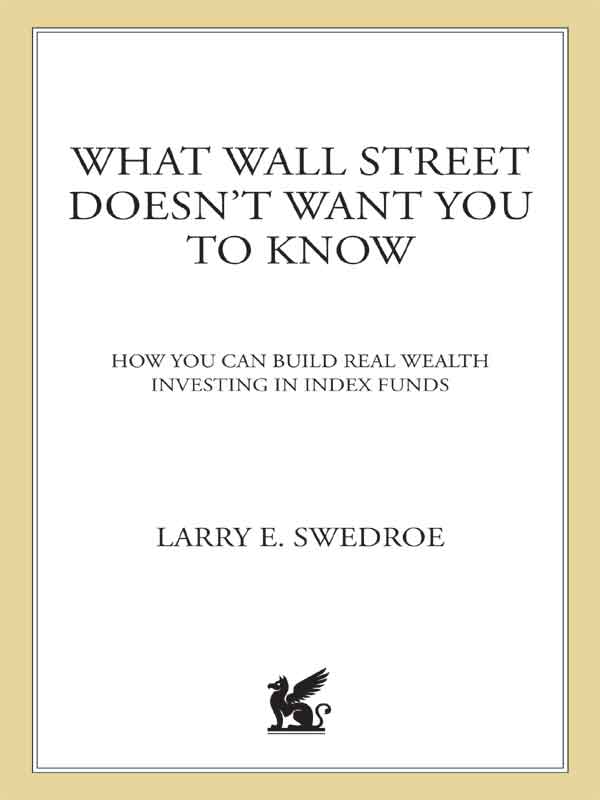What Wall Street
DOESNT WANT
YOU TO KNOW
A LSO BY L ARRY E. S WEDROE
The Only Guide to a Winning
Investment Strategy Youll Ever Need
What Wall Street
DOESNT WANT
YOU TO KNOW

How You Can Build Real Wealth
Investing in Index Funds

LARRY E. SWEDROE

WHAT WALL STREET DOESNT WANT YOU TO KNOW: HOW YOU CAN BUILD REAL WEALTH INVESTING IN INDEX FUNDS. Copyright 2001 by Larry H. Swedroe. All rights reserved. Printed in the United States of America. No part of this book may be reproduced in any manner what soever without written permission except in the case of brief quotations embodied in critical articles or reviews. For information, address St Martins Press, 175 Fifth Avenue, New York N.Y 10010.
www.stmartins.com
Library of Congress Cataloging-in-Publication Data
Swedroe, Larry E.
What Wall Street doesnt want you to know : how you can build
real wealth investing in index funds / Larry H. Swedroe.
p. cm.
ISBN 0-312-27260-X (hc)
ISBN 0-312-33572-5 (pbk)
EAN 978-0312-33572-4
1. Index mutual funds. 2 Mutual funds. I. Title.
HG45306.S896 2001
332.6327dc21 00-046699
D 1 0 9 8 7 6 5 4 3
This book is dedicated to the most beautiful person I know, my wife, Mona
-walking through life with her has truly been a gracious experience
and my daughters, the three Js: Jodi, Jennifer, and Jacquelyn
no father could he more proud.
It seems to me what is called for is an exquisite balance between two conflicting needs: the most skeptical scrutiny of all hypotheses that are served up to us and at the same time a great openness to new ideas. If you are only skeptical, then no new ideas may get through to you. You never learn anything new. You become a crotchety old person convinced that nonsense is ruling the world. (There is, of course, much data to support you.)
On the other hand, if you are open to the point of gullibility and have not an ounce of skeptical sense in you, then you cannot distinguish useful ideas from the worthless ones. If all ideas have equal validity, then you are lost, because then, it seems to me, no ideas have any validity at all.
Carl Sagan, The Burden of Skepticism,
Pasadena lecture, 1987
Contents
Chapter 1
Past Performance of Fund Managers Is Not a Predictor of Future Performance
Chapter 2
Markets Are Efficient and Active Managers Are Highly Unlikely to Add Value
Chapter 3
Increasingly Investors Are Shifting to Passive Management
Chapter 4
Neither Fund Managers nor Individuals Can Consistently Identify Mispriced Securities
Chapter 5
Timing the Market Is a Losers Game
Chapter 6
Exposure to Risk Factors Determines Investment Returns
Chapter 7
Investors Should Focus on the Long, Not the Short Term
Chapter 8
Active Management Imposes a Large Negative Impact on After-Tax Returns
Chapter 9
Understanding and Controlling Human Behavior Is an Important Determinant of Investment Performance
Chapter 10
Play the Winners Game and Invest the Way Really Smart Money Invests Today
What Wall Street
DOESNT WANT
YOU TO KNOW
Introduction
I am a principal of both the St. Louis-based investment advisory firm Buckingham Asset Management (Buckingham) and BAM Advisor Services (BAM), a provider of turnkey asset management services to financial advisory firms. Through Buckingham we provide investment advice to individuals, qualified retirement plans, and charitable endowments. Through BAM we provide administrative services, marketing materials, and investment advice and research on capital markets to other professional advisors throughout the United States. As director of research, I contribute to our firms newsletter, the Educated Investor. One purpose of this newsletter is to expose the fairy tales, lies, myths, and legends created by the propaganda machines of Wall Streetwhat Jane Bryant Quinn calls investment pornography. In other words, the newsletter seeks to enlighten the reader as to what Wall Street doesnt want investors to know. John F. Kennedy stated it well: The great enemy of truth is very often not the liedeliberate, contrived, and dishonestbut the mythpersistent, persuasive, and unrealistic. An equally important function is to familiarize our readers with the Nobel Prize-winning investment strategy known as Modern Portfolio Theory (MPT). The fundamental tenets of MPT can be summed up as follows:
Current market prices reflect the total knowledge and expectations of all investors, and no investor can consistently know more than the market does collectively.
New information is incorporated into prices so efficiently (quickly) that prices instantly adjust to new data. This is why the Efficient Markets Theory (EMT) is an integral part of MPT.
The competition among investment professionals is intense, making it very difficult to obtain a competitive advantage.
If an investor gains a competitive advantage by discovering a market anomaly, competition will rapidly copy the strategy, thereby eliminating the anomaly.
Risk and return are related, and riskier assets must therefore provide higher expected returns as compensation for the extra risk. Those higher returns are, of course, not guaranteed, or there would not be any risk. However, the longer the investment horizon, the more likely it is that the expected will occur.
Portfolios can be constructed that are expected to deliver the greatest expected return for any given level of expected risk.
Active management, the art of picking stocks and timing the market, is a losers game because of the hurdle of the costs of research, trading, and taxes.
Passive management is the winners game, since that strategy is most likely to achieve the desired results.
This book is divided into 10 chapters. The first 9 cover what Wall Street doesnt want investors to know. In these chapters you will learn:
Why past performance of active managers should not be used to predict future performance.
How over the long term, the efficiency of the market, combined with the costs of research, trading, and taxes, creates virtually an insurmountable hurdle for active managers.
Why certain asset classes provide higher expected returns (as compensation for greater risk) and how you can put this knowledge to work.
Equity markets are far riskier than thought by the average investor, and, therefore, a very long investment horizon and the discipline to stay the course are key ingredients of the winners game.
Why institutional investors have been rapidly adopting MPT and passive asset class investing, and why individual investors are joining the bandwagon.
How investment performance can be impacted by the emotional side of investing.


